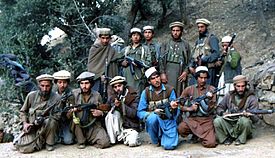- Mohammad Yunus Khalis
-
Mawlawi Mohammad Yunus Khalis (alternate spellings Yunis and Younas) (Arabic: محمد يونس خالص; c. 1919 − July 19, 2006) was a mujahideen commander in Afghanistan during the Soviet invasion of Afghanistan. His party was called Hezb-i-Islami ("Party of Islam"), the same as Gulbuddin Hekmatyar's party. The two are commonly differentiated as Hezb-e Islami Khalis and Hezb-i-Islami (Gulbuddin).
He was a hardline fundamentalist, and wrote the 1991 treatise "An Appeal to Support the Holy War in the Sudan".[1] After the fall of the communist government in 1992, his forces controlled Nangarhar Province in eastern Afghanistan.
Maulvi Mohammad Yunus Khalis was born in 1919 in Khogyani District, Nangarhar Province in Afghanistan and became a powerful figure in his country’s turbulent modern history. Educated in Islamic law and theology, Khalis exercised influence through his conservative vision of Islamic society. Sometimes referred to as the "Godfather" of Nangarhar, he was also a shrewd politician who wielded considerable power behind the scenes during one of the most turbulent and violent periods in his country’s history.
After the overthrow of Mohammad Zahir Shah by Mohammad Daoud in 1973, Khalis fled to Pakistan and joined Hekmatyar’s Islamic Party (Hezb-e Islami). After the Soviet invasion of Afghanistan, Khalis broke with Hekmatyar and established his own party under the same name.
Khalis reportedly entered Afghanistan many times to join his forces in waging war against the Soviets and their local proxies. Many prominent mujahideen commanders including Abdul Haq, Amin Wardak and Jalaluddin Haqqani were affiliated with Khalis's party, Hezb-e-Islami.
After the fall of the Communist regime in 1992, Khalis participated in the Islamic Interim Government. He was a member of the Leadership Council (Shura-ye Qiyaadi), but held no other official post. Instead of moving to Kabul, he chose to remain in Nangarhar. His party controlled major parts of this politically and strategically important province. The Taliban brought Nangarhar under their control in September 1996 and Khalis was quietly supportive of the Taliban movement.
Khalis resided in Pakistan in the late 1990s. After the fall of the Taliban, his supporters regained their stronghold in Jalalabad where Khalis exerted considerable influence, although he held no official post. Two of his close associates, Haji Abdul Qadir and Haji Din Mohammad served as governors of Nangarhar Province after the fall of the Communist regime.
In 2001, the United States claimed that Khalis helped facilitate Osama bin Laden's escape from Tora Bora.[2]
According to a statement from his son, Anwar al-Haq Mojahed, Khalis died on July 19, 2006.[3]
References
- ^ Fitzgerald, Patrick J. United States of America v. Enaam M. Arnaout, "Governments Evidentiary Proffer Supporting the Admissibility of Co-Conspirator Statements", before Hon. Suzanne B. Conlon
- ^ Scehuer, Michael. "Marching Towards Hell", 2008
- ^ "Leader of Afghan mujahideen dies", BBC.co.uk, Monday, 24 July 2006.
External links
- Biography at www.khyber.org
- Khalis and the Moderate Parties - Library of Congress country studies
Categories:- 1919 births
- 2006 deaths
- Afghan military personnel
- History of Nangarhar Province
- People from Nangarhar Province
- Afghan anti-communists
- Hezb-e Islami Khalis politicians
- Pashtun people
Wikimedia Foundation. 2010.

